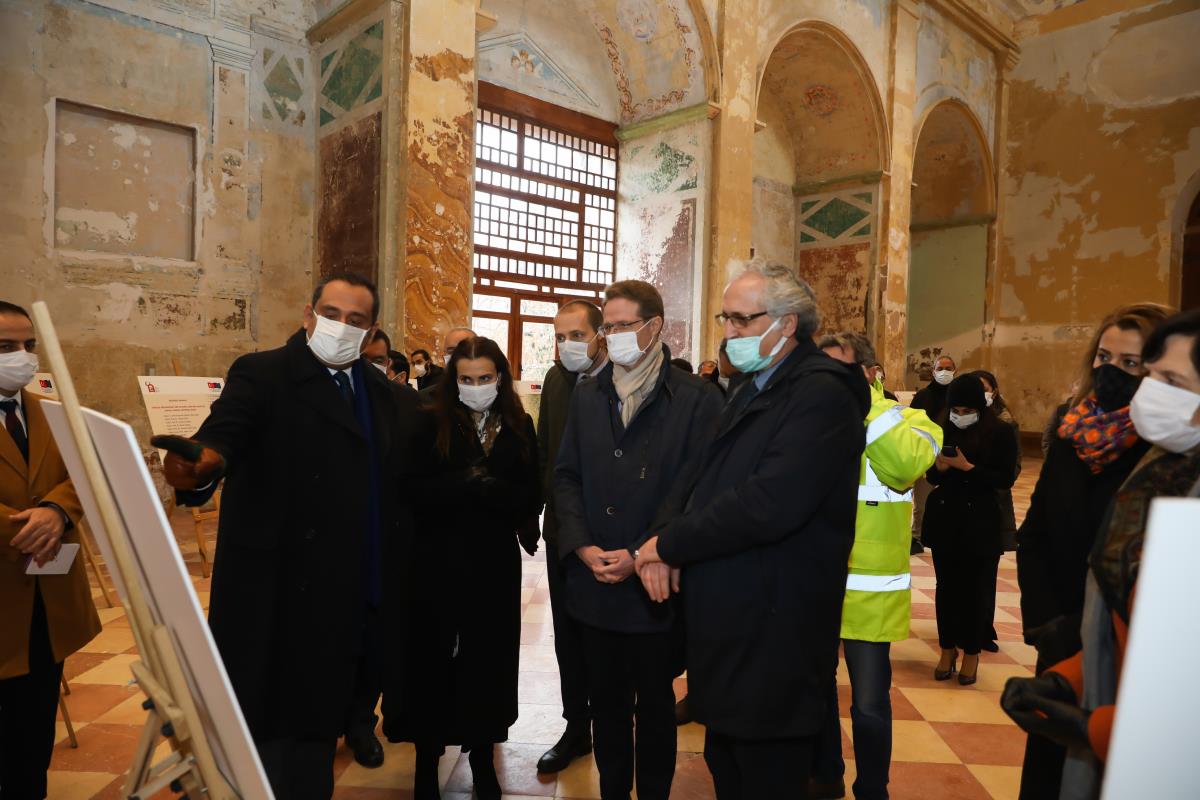The Head of EU Delegation to Turkey, Ambassador Nikolaus Meyer-Landrut has visited the Turkish Institute of Archeology and Cultural Heritage. Examining the complex and the Archeometry Laboratory at the Kendirli Cultural Center in Gaziantep, which has undergone restoration to operate as an institute center, Meyer-Landrut emphasized the value of cooperation between institutes and artists in Turkey within the framework of 'culture negotiations' with the EU and dialogue with civil society.

Turkish Archeology and Cultural Heritage Institute, co-financed by the Republic of Turkey and the European Union, in partnership with the Ministry of Culture and Tourism of the Republic of Turkey and Gaziantep Metropolitan Municipality, with the support of the European Commission, hosted Ambassador Meyer-Landrut, Libor Chlad from the EU Delegation to Turkey, and Ambassador Meyer-Landrut's wife Madeleine Meyer-Landrut.
During the visit made to Gaziantep Kendirli Cultural Center, the Ambassador Meyer-Landrut and his companions were welcomed by Davut Gul, Governor of Gaziantep, Fatma Sahin, Metropolitan Mayor of Gaziantep, Prof. Dr. Nevzat Cevik, Hakan Tanriover, Ministry of Culture and Tourism, Counsellor to the Minister and Project Officer, and Mehmet Bulent Ozturk, Provincial Director of Cultural and Tourism of Gaziantep.
Expressed their satisfaction with being a shareholder in the establishment of Turkey's Archeology Institute, which is of great importance to the EU, Meyer-Landrut said, "the foundations of 'new' cultural and science bridges are laid between the EU and Turkey by this means". Emphasizing the value of cooperation between institutes and artists in Turkey within the framework of "cultural negotiations" and civil society dialogue with the EU, Meyer-Landrut expressed his excitement from "the launch of this cultural investment during his term". Meyer-Landrut, who also works on history, expressed his desire to contribute to the Institute's publications that he gives a special place.
During the Visit, the Outcomes of the Intensive Works of 430 Scientists, Artists, Technical Teams, and Bureaucrats were Conveyed
Speaking on behalf of the Institute, Prof. Dr. Nevzat Cevik said: “The Institute, whose establishment has been dreamed of for more than 100 years and whose deficiency has always been expressed, was established to further develop the science of archeology in Turkey, to support those working in this field in all matters, and to provide coordination between relevant institutions. The Institute to become a 'home' with great power through the contributions of all stakeholders, also contributes to the development of international dialogue between Europe and Asia with the common culture nurtured by the deep history. The visit of Ambassador Meyer-Landrut is also very valuable in this sense.”
Emphasizing that the Archeology Institute will be the first institute in Turkey to have a 'site management' laboratory, with the Archeometry Laboratory prepared per the recommendations of the Science Board, Hakan Tanriover emphasized that with the project, he managed to bring together prominent experts in different disciplines of culture and art from Turkey and Europe.
Tanriover said: “Our works are coming to life with the efforts of 430 individuals in the fields of culture, art, and science. In this sense, we ensure coordination in different fields, from scientific efforts to publications, from education to culture and arts events, and tourism and promotion, along with very valuable names who put their expertise and efforts forward. The efforts and guidance of Hale Ural, Prof. Dr. Nevzat Cevik, Prof. Dr. Kutalmis Gorkay, Prof. Dr. Aydin Gulan, Prof. Dr. Edibe Sozen, Prof. Dr. Rana Ozbal, Prof. Dr. Fahri Temizyurek, Dogan Hizlan, Fahri Aral, Architect Levent Cirpici, Asim Erverdi, Guniz Atis Azrak, and Asli Gungor lay at the center of our efforts.”
Within the framework of the Institute's support for scientific studies, initially, the "excavation notebooks" related to Turkish archeology were digitized. The first Digital Archeology Archive actualizes by the Archeology Institute through the scanning of 1.5 million documents in the state archives and the preparation of a collection of 50 thousand digital libraries. Following the publication of 27 works of art that will be brought to the cultural life as of mid-February, the educational activities, for which the curriculum has been completed, will take start in April according to the pandemic conditions.
AB-TR Anadolu Arkeoloji ve Kültürel Miras Enstitüsü Projesinin tüm bileşenleri tamamlanmış olup, Türk Arkeoloji ve Kültürel Miras Enstitüsü kuruluş çalışmaları, 7439 sayılı Türk Arkeoloji ve Kültürel Miras Vakfı Kanunu ile tamamlanmıştır.
Daha fazla bilgi için: takme.org
This will close in 0 seconds